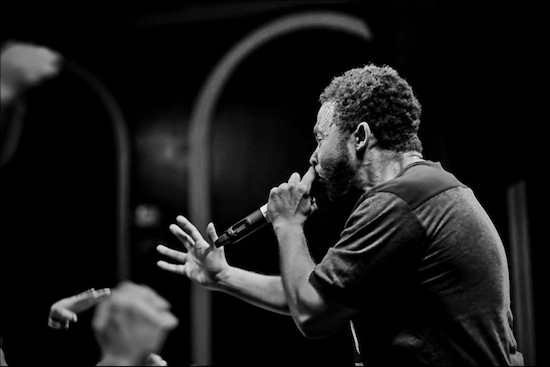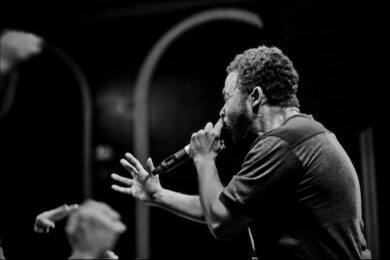Queens native Troy Jamerson, best known as Pharoahe Monch, is one of the most gifted rappers of his generation. As part of Organized Konfusion, with fellow MC Prince Po, he released three records, 1991’s self-titled LP, Stress: The Extinction Agenda three years later and The Equinox in 1997 to critical acclaim, with his rhymes on ‘Bring It On’, from Stress, widely viewed as some of the best ever written, with Eminem once suggesting that Monch had always been "ahead of his time", possessing an ability that would "kill most rappers". As a solo artist, meanwhile, he has released three records, with his fourth, Post Traumatic Stress Disorder, released last month on W.A.R. Media/Duck Down Music. We caught up with him at the end of his recent European tour.
The artwork for your recent single, ‘Bad M.F.’, resembles a film poster, referencing one of your greatest influences. You rewrite and reshape lyrics as a screenwriter might, constantly going back to see which narrative scenes work well.
Pharoahe Monch: Well, you know, I am a big film fan, and the visuals for the project are so gripping, as are the songs on the album. The album is almost like a motion picture, so I thought I would go with that theme, to give people a sense of what the album would sound like.
Post Traumatic Stress Disorder follows up on some aspects of your previous work, such as 2011’s W.A.R. (We Are Renegades) which surveyed the struggle to overcome a depressive state, the nature of the shadowy illness and its often creativity-sapping mindset. It’s a concept record, exploring both the idea of a man against the industry and oppression, very much in the vein of Melvin Van Peebles’ 1971 film, Sweet Sweetback’s Baadasssss Song which I couldn’t help but think of.
PM: Those early blaxploitation films were a big part of my growing up, and that shaped the images that I tried to create. Those films are embedded in my head; the films, the music, the struggle… even how Melvin Van Peebles had to go about making that film is similar to my making of the W.A.R. (We Are Renegades) album. Post Traumatic Stress Disorder still comes from the emotional and psychological effect of where I’m at after that album, after making those statements and trying to be a rebel and a renegade.
Throughout the dark, grimy production, which is a sonic trademark of much of your work, there’s seems to be a quality of hope, perhaps a reflection on a more positive, creative period?
PM: I am very excited and very happy right now, and I am in a good place. It is important to let people know that, because the new album is a reflection on depression and suicide. All of those things that have happened to people that have experienced those life-threatening things, and getting through them. I had to dig deep to find these songs within myself and put them on paper.
For this record you reunited with Lee Stone, a long-time collaborator, who worked with you on your first two solo albums, Internal Affairs and Desire. How did you two meet initially?
PM: I met Lee years and years ago. I was still working with Organized Konfusion and he liked the tone of my voice. Good producers can always bring something out of you that is inside, that maybe only they can see, and they can pull that out. It’s a real professional relationship, and inside of that is a real great friendship. We can have hours of conversation about politics, without even discussing music, or working on a song. We call each other up about films, and life… everything.
So much has changed within music since your work with Organized Konfusion and early solo releases on Rawkus Records, but you seem to have embraced those changes.
PM: In many ways, the internet is a beautiful thing, because it allows you to gain access and create your own destiny and future. For me, it’s been great – on Twitter and Facebook I get to be silly and funny. Some of my fans don’t want to me to joke around so much, as my image is quite serious, but I get to have a real relationship with them through these social networks. I still am the serious person people think I am, but it’s good to let people know about the comedies and sports I love, and the silly things I love, and the humility: that I fail, and I fall and I slip in the snow, just like everyone else.
This duality goes back to the way you’re addressed in terms of name: friends and family call you Troy, your birth name, with ‘Pharoahe’ acting as something of a floating signaller: an idea more than anything else.
PM: My friends call my Troy, because they know the difference, but when they see me perform they are blown away by the transformation. Troy is really, really quiet and laid back. Troy has asthma, and they have known Troy to be soft-spoken, but when they come to see Pharoahe at a show, I can see their eyes get big. They’re thinking, "holy shit!"
The truth is that there is an internal aspect within me all the time, and there are moments when Troy is on stage as well, but that’s the internal truth. With the business truth it becomes difficult, because you want to be able to leave the business job, in the sense of those times when you don’t want to take photos. I think people who do want to embrace stardom like that – the universe brings them closer to it, and people who shun it, the universe maybe protects them a little more, you know? I never wanted to be a celebrity.
You have never really moved from New York, a city that has provided you with constant inspiration, and a rootedness. And for me, your work acts as an alternative soundtrack to that city, as intuitive to its subject as perhaps DJ Shadow’s work on Mark Singer’s brilliant documentary, Dark Days, which instantly came to mind.
PM: New York has changed a lot over the years, economically, socially and politically, with its housing, jobs and structure – the dynamics of the city, the architecture of the city – as well as hip-hop. When that happens, it restructures and reformulates how you even think about what music sounds like, and how to make it. I think the idea that the politics and racism and the social aspect has evolved is a grander one, and people are more willing to accept it. Yet at certain times, I think it hasn’t evolved at all as much as, for example, the architecture of the city has.
Your work has been built on collaboration, and Post Traumatic Stress Disorder is full of radiant partnerships that reference your past as well as the future.
PM: On this record I worked with Black Thought – I am big fan of his. We haven’t worked together since the last [Talib] Kweli record we did [Quality in 2002]. Speaking of Kweli, I have him on a separate song – both of the songs are amazing, they are really incredible. And then we have Denaun Porter of D12 fame, who is one of my favourite producers. He’s also a great singer, so we have him singing on the album. I also worked with Marco Polo, and a whole lot of people assembled who I worked with before from the W.A.R. album.
Your lyrical ability as well as preoccupations, agility and delivery, set you apart from many of your peers, and your new record suggests that you are increasingly attracted to the transformative power of meaningful music.
PM: Definitely. A lot of times when you take risks and want to create art, people think you are unorthodox, particularly with what the trend is currently, and that’s not the case. I like a lot of stuff that is popular right now, but there are intellectual choices to doing what I do, and sometimes the choices are based on the art. I have been fortunate to survive. I could be better known, but that’s the choice you make: these choices to be funny or vulgar, complex, or passionate, against the grain or with the grain; they are all artistic choices. I am just glad that my fans understand my preoccupations. I can go simple or complex – they are all choices I make, to make the relationship to the songs better.
Despite the influence of your home city, a lot of your work has gained more acclaim in Europe – has that surprised you?
PM: I think that my work goes across well in Europe, as there is a frequency there that connects with my thoughts on art and music. Art is somewhat promoted in Europe, and not restricted. [In America] there is an over-abundance of people that are inundated with advertisements and mind control and not being allowed to think for themselves, or to choose for themselves, their own opinions about art. I think in a place where art is freer, people are more tuned in to my frequency.
Post Traumatic Stress Disorder is out now via W.A.R. Media/Duck Down Music



